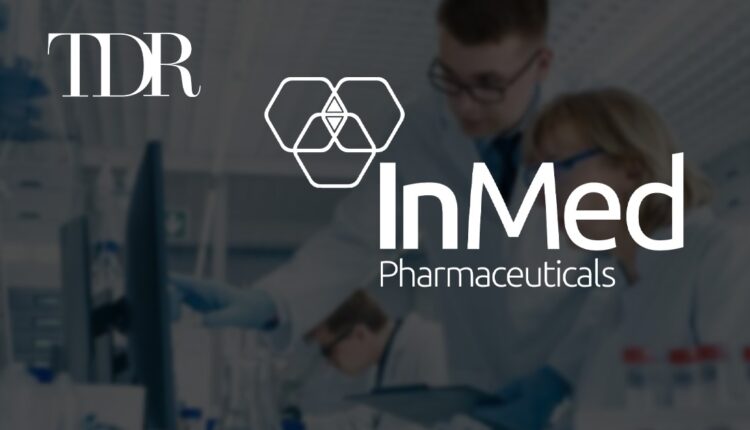
InMed Pharmaceuticals Leads Alzheimer Research Breakthroughs
The TDR Three Key Takeaways regarding InMed Pharmaceuticals and Alzheimer research:
- InMed Pharmaceuticals focuses on cannabinoids for Alzheimer’s treatment.
- InMed’s Alzheimer compounds target multiple brain pathways.
- InMed’s Alzheimer research gains expert endorsement
InMed Pharmaceuticals (NASDAQ:INM), is at the forefront of research in Alzheimer’s treatment. With an innovative approach that leverages cannabinoid analogs and small molecule drug candidates. Alzheimer’s disease affects millions worldwide, leading to severe cognitive decline, memory loss, and anxiety. Despite extensive research and investment, current treatments offer limited efficacy. Traditional approaches, such as targeting amyloid beta plaques, have shown modest success at best. Eric Adams, CEO of InMed Pharmaceuticals, highlights the shortcomings of these approaches: “What they learned, though, is once you reduce the amount of the plaque, you don’t necessarily see an improvement. You can maybe delay the disease to some degree, but you can’t stop it and you can’t reverse the effects of what’s already happened.”
InMed Pharmaceuticals’ strategy diverges from these conventional methods. By focusing on cannabinoid analogs, the company aims to exploit the natural ability of cannabinoids to cross the blood-brain barrier. Adams explains, “Cannabinoids can naturally transport into the brain. There’s something called the blood-brain barrier, and it’s designed to keep things out of the brain. Because the body makes its own cannabinoids, every human has two cannabinoids in their body, it naturally allows for the transport of these classic compounds.”
InMed’s development of proprietary analogs of natural cannabinoids. These analogs, designed and patented by InMed, offer enhanced efficacy and safety profiles. “What we learned in the meantime is that you can do certain changes, very minor changes, to the structure of these cannabinoids, making them what we call analogs of the natural compounds. You can enhance their potential efficacy, their potential safety,” Adams elaborates.
A particularly promising aspect of InMed Pharmaceuticals’ Alzheimer research is its multifaceted approach to Alzheimer’s therapy. The company’s compounds target multiple pathways in the brain, including CB1 and CB2 receptors as well as the PPAR pathway. This approach addresses not only amyloid beta plaques but also neuroprotection, neurogenesis, and neuroinflammation. Adams notes, “It’s this combination, this multifactorial approach of not only trying to hit one thing like amyloid beta and say, let’s get rid of that. It’s hitting a number of things that will give you a myriad of effects that may be able to contribute to improving the patient’s outcome.”
Anthony Varrell, a co-host of the Trade to Black podcast, underscores the potential impact of InMed’s research: “Alzheimer’s is an indication that affects millions of people, and I like to think that us as a civilization, we’ve gotten pretty advanced when it comes to medicine to an extent. What are some of the main roadblocks as it relates to therapeutics and Alzheimer’s? Because it seems like there’s just something in the way that just can’t be overcome from a therapeutic perspective.”
InMed Pharmaceutical’s advancements have attracted the attention of prominent experts in the field, including Dr. David Morgan, a leading figure in Alzheimer’s research. Morgan’s involvement as an advisor is a strong endorsement of the company’s potential. “As we go out and start to talk to experts about what we’re seeing, bringing them over the wall, as it were, to look at the confidential data, we’re starting to see their excitement levels as well,” Adams remarks. “He [Morgan] is a leading expert in designing and figuring out which type of in vivo studies—animal studies are going to be predictive of a positive outcome.”
In addition to Alzheimer’s treatment, InMed’s pipeline includes programs targeting other significant medical needs. The company is exploring treatments for dry macular degeneration and has conducted phase two clinical studies for epidermolysis bullosa. As Adams states, “We’re focused primarily on dry macular degeneration with the 089 program and the Alzheimer’s program. There’s some other things deeper in the pipeline, but it’s really at the research stage.”
The potential market impact of InMed Pharmaceutical’s research is substantial. The aging population in countries like the US and Canada points to a growing prevalence of Alzheimer’s, underscoring the urgent need for effective treatments. Varrell emphasizes this point, saying, “When you look at some of the aging countries that we’re in, like the US and Canada, there’s stats that show the amount of cases that society is going to be taking on over the next 10 to 15 years.”
InMed Pharmaceuticals represents a hope in the quest to combat Alzheimer’s. The company is well-positioned to make significant strides in treating this challenging disease. As Adams concludes, “It’s one thing for us internally to see the data and get excited, but to see the responses that we’ve been getting in terms of engaging in dialogue is very encouraging.”
By advancing their Alzheimer research and focusing on novel therapeutic approaches, InMed Pharmaceuticals continues to lead the charge in the fight against Alzheimer’s, offering hope to millions affected by this relentless disease. Want to be updated on all things Psychedelic, Cannabis, AI, and Crypto? Subscribe to our Daily Baked in Newsletter!



